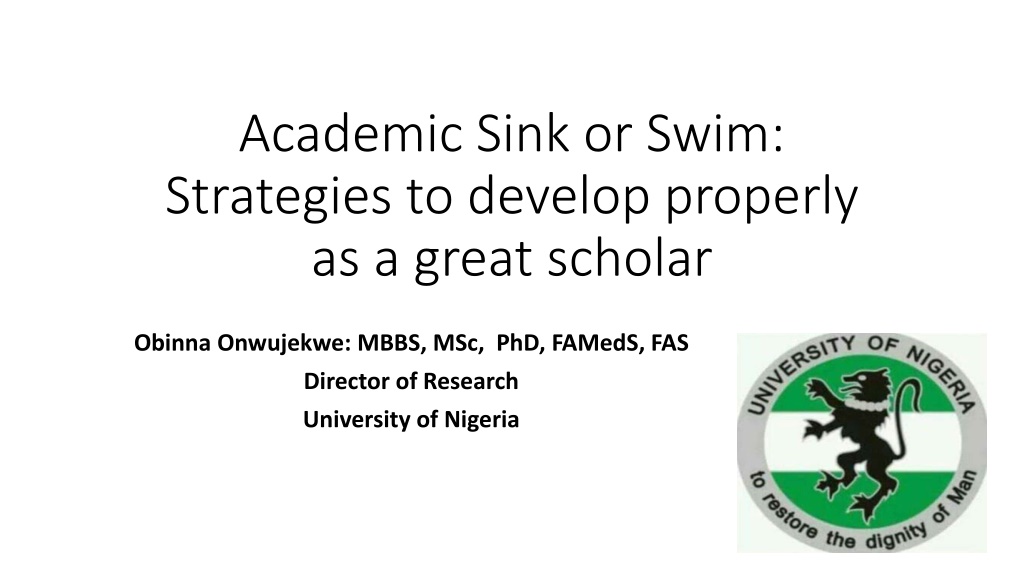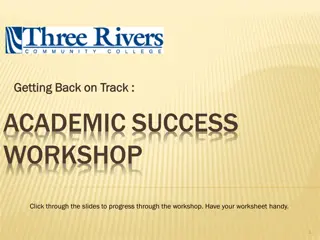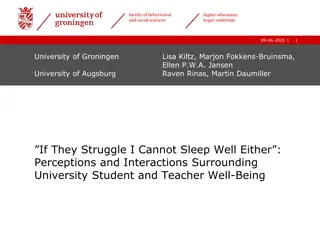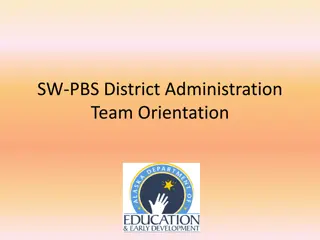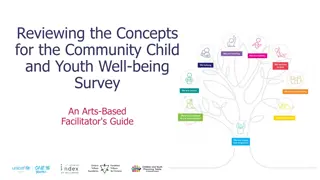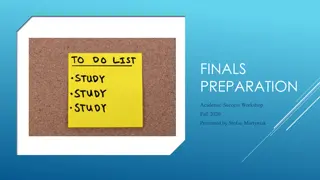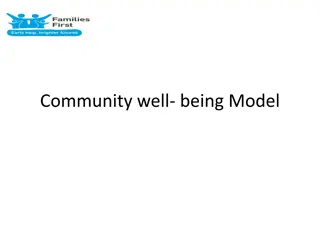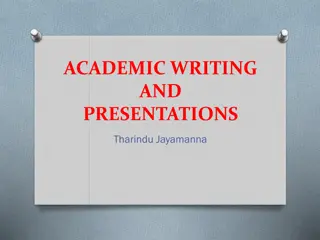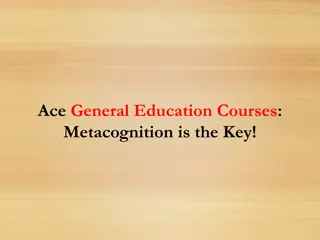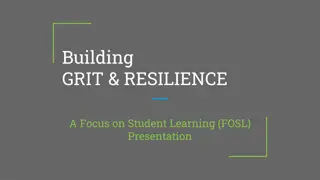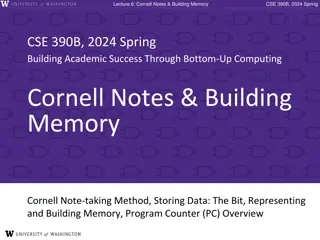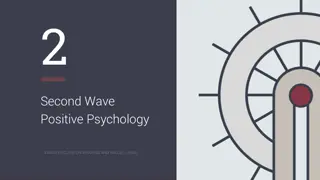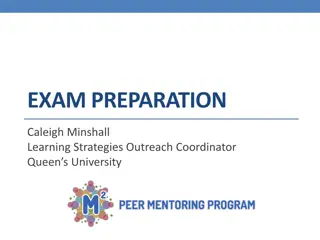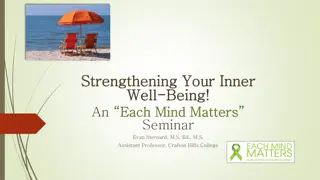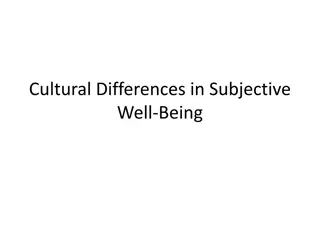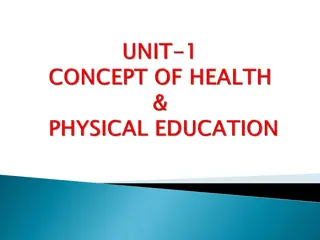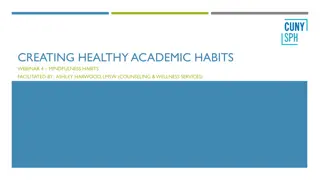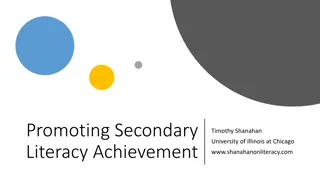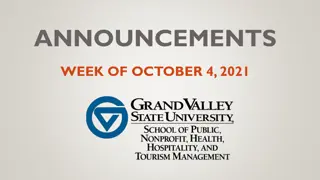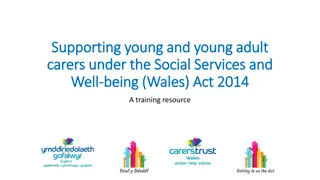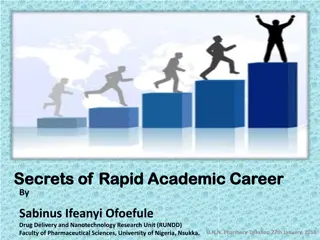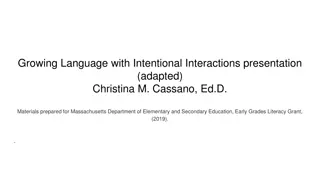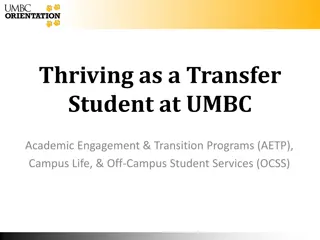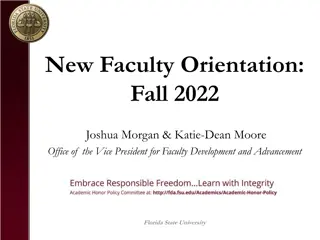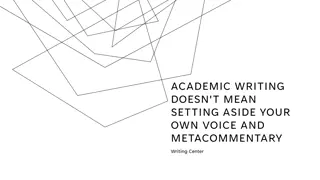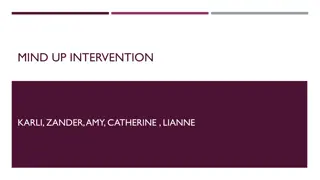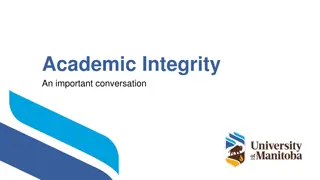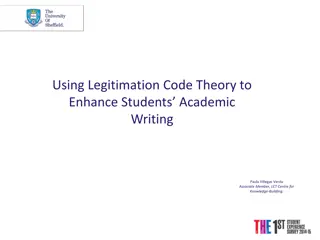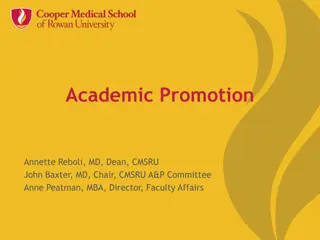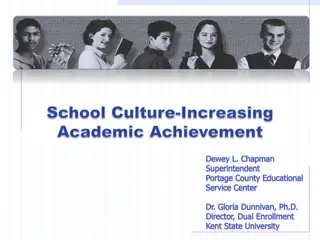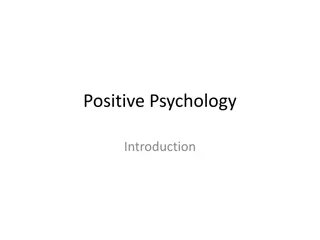Strategies for Academic Success and Well-being
Discover how academics can navigate the challenges of balancing work and life in the modern academic and research sectors. Learn about the importance of recognizing strengths, managing tasks, achieving productivity, and ensuring happiness and well-being. This presentation provides insights into roles of academics, work-life balance, and effective strategies for academic success, offering valuable guidance for scholars striving to excel in their fields.
Download Presentation

Please find below an Image/Link to download the presentation.
The content on the website is provided AS IS for your information and personal use only. It may not be sold, licensed, or shared on other websites without obtaining consent from the author. Download presentation by click this link. If you encounter any issues during the download, it is possible that the publisher has removed the file from their server.
E N D
Presentation Transcript
Academic Sink or Swim: Strategies to develop properly as a great scholar Obinna Onwujekwe: MBBS, MSc, PhD, FAMedS, FAS Director of Research University of Nigeria
Outline of the presentation Outline of the presentation Roles of academics teaching, research, consultancies, community service and self-happiness Work-life-family balance 5 steps 10 strategies Conclusion
Introduction Introduction The ability to strike a perceived sense of balance between work and life represents a challenge for many in academic and research sectors around the world. Before major shifts in the nature of academic work occurred, academia was historically seen as a rewarding and comparatively low- stress working environment [1]. Academics today need to manage many tasks during a workweek. The current academic working environment often prioritizes productivity over well-being, with researchers working long days, on weekends, on and off campus, and largely alone, potentially on tasks that may not be impactful.
Roles of academics Roles of academics- - develop properly as a great scholar develop properly as a great scholar Teaching, research, consultancies, community service and self-happiness Contributions to base academic unit(s) and the university Publish or perish? Research or perish? Teach or perish? National, Regional and Global Visibility National, Regional and Global Impact Self and family well-being Functioning outside our comfort zones How to balance all, with increased productivity and assured happiness and well-being?
5 Strategies for Academic Success: Using Your 5 Strategies for Academic Success: Using Your Strengths (Bakken R, 2018) Strengths (Bakken R, 2018) https://extension.harvard.edu/blog/5-strategies-for-academic-success- using-your-strengths/
1. Know your strengths. 1. Know your strengths. It s human nature to want to correct weaknesses. But knowing your strengths and how to use them effectively can have a much more substantial effect on success and well-being. Once you know what your strengths are, you can play to them. But it s also important to know that sometimes strengths need to be tempered. Every strength if overused becomes a deficit, says Levy.
2. Set specific goals. 2. Set specific goals. Achieving your goals depends heavily on how well you can manage your time. Levy recommends making a priority pie that maps out how you ll divide your time over the course of a semester. When you say yes to becoming a student, you have to say no to other things, she says. So goal-setting requires a strategic plan for the semester. Students who do better in general are the ones who take time to plan. The best goals are specific, personal, and flexible.
3. Prioritize happiness 3. Prioritize happiness Feeling good about what you re doing and why you re doing it is the best way to ensure success. Happiness often leads to success, but success on its own may not lead to happiness. As such, prioritizing your own wellness is key to reaching your goals. Levy says well-being consists of positive emotions, engagement, meaning, and achievement. One exercise that is recommended is writing down three good things at the end of each day. These can be things you re proud of, things you re grateful for, or things that simply bring a smile to your face.
4. Be resilient 4. Be resilient endurance is important endurance is important Even with a good plan, obstacles will arise. How well you deal with those obstacles depends on your perspective. There are two basic mindsets: fixed and growth. Fixed mindsets view mistakes or setbacks as insurmountable. Growth mindsets view them as opportunities for positive change. If you lean toward a fixed mindset, the good news is that it s not permanent. Training your brain to see opportunity where you once saw a roadblock is possible. Give yourself permission to be human, Levy says. Predict you re going to make mistakes. One way to build resilience is by preparing for obstacles with implementation intentions.
5. Make time to recover. 5. Make time to recover. Rather than avoiding stress altogether, set aside time to mentally and physically recover. As a student, you may sometimes fall into a stretch zone, where you re extending yourself to accommodate for different obligations. Periods of stress can actually be positive and motivating if they expand your perception of what s possible. But it can lead to chronic stress when you don t build in time to recover. Viewing your eight hours of sleep every night as sacrosanct can go a long way toward staving off chronic stress. So before you pull another all-nighter, think about the effects it may have on you the next day. Taking breaks, setting aside time for meals, and enjoying recreation can help fuel you and keep you on course to achieve your goals.
Martin Luther King, Jr. An individual has not started living until he can rise above the narrow confines of his individualistic concerns to the broader concerns of all humanity. - a university system has not started functioning properly until it starts generating research outputs that will enhance instituional and national development
Ten simple rules to improve academic work Ten simple rules to improve academic work life balance Bartlett et al (2021) life balance Rule 1: Long hours do not equal productive hours One common reason for work life imbalance is the feeling of lagging behind as a result of the present-day competitive nature of academia. This has led to incorrectly normalized practice of overwork, due to a sense of pressure from colleagues or ourselves, contributing to increasing mental health problems in academia
Rule 2: Examine your options for flexible work practices Examine your relationship with your work, and try alternative schedules. Review your expected obligations, employer work hour rules, and offered benefits. Where possible, make use of modernization of work tools (such as remote work methods using digital technologies); working time is no longer exclusively based on in-person presence at the workplace, but rather the accomplishment of tasks
Rule 3: Set boundaries to establish your workplace and time Setting spatial and temporal boundaries around your work is important for focusing on the task in hand and preventing work from taking over other parts of your life. When you are in the office and need to focus, make sure you can work in a quiet place where colleagues are unlikely to distract you. If you work in a shared office space, communicate with those around you to let them know your needs, or if you need complete silence, then consider working in a designated space for focused work. While working from home, some may struggle to disconnect from work, step away from screens, and set clear boundaries
Rule 4: Commit to strategies that increase your efficiency and productivity Rule 4: Commit to strategies that increase your efficiency and productivity Do not overcommit. Learn to say no . Try to drop activities that drain your energy, such as nonessential meetings that do not enhance your life or career, and be efficient within this limited time with set goals. Many people use to-do lists and outline daily/weekly tasks, defining both work- and nonworkrelated obligations that need to be accomplished. Manage your time. Learning how to effectively manage your time and focus while at work is critical. Minimize decision fatigue. Decision fatigue refers to the deteriorating quality of decisions made by an individual after a long session of decision-making. Collaborate. Workplace and home collaborations can take some of the load off and help in managing stress. Discover your own strategies. Try to figure out what strategies work for you, and apply these to your life. Individuals respond differently to time of the day, physical conditions, and stress. Productivity may come with creative arrangements, and a high degree of organization
Rule 5: Have a long Rule 5: Have a long- -term strategy to help with term strategy to help with prioritization, and review it regularly prioritization, and review it regularly Having a long-term strategy that considers what you want to achieve and the timelines needed to get there can help with prioritization and deciding what to take on and what to say no to. This not only includes goals linked to your academic career but also what is important to you outside of work, whatever this may be. Consider using weekly time management charts to assess your task delegation retrospectively
Rule 6: Make your health a priority You are not only defined by your work. Spending time on self-care and relaxation is a necessity in life to maintain a healthy body and mind, leading to a fulfilling lifestyle. Eat a healthy diet. Get enough sleep. Lack of sleep increases stress, and associated fatigue is linked to poor work life balance
Prioritize your physical and mental health Prioritize your physical and mental health Set time aside for individual or group physical activities of your choice. Schedule specific times for social activities and exercise to unwind, by arranging ahead of time with others or signing up to regular classes, making the plans harder to cancel. Using the gym at your workplace during a break can freshen you Try meditation or mindfulness exercises. Make time for your hobbies and relaxation.
Rule 7: Regularly interact with family and friends Your work schedule does not need to lead to loss of your personal relationships. Scheduling time off to meet in-person or interact online with your loved ones in advance will make it harder to cancel plans in favor of working longer.
Rule 8: Make time for volunteer work or similar commitments that are important and meaningful to you Many find additional engagements outside of their day to day jobs both important and rewarding. These activities would not be considered hobbies or relaxation, examples may include volunteering for the local community, regional and online communities (e.g., student advocacy groups), time on boards or committees outside of work (e.g., acting as treasurer or secretary of a club), and learning a new language when you have moved to a new place
Rule 9: Seek out or help create peer and institutional support systems Support systems are also critical to your success, and building more than one will increase your chances of success and balance overall [59]. At work, join forces with coworkers who can cover for you and vice versa when family conflicts arise.
Rule 10: Open a dialogue about the importance of work Rule 10: Open a dialogue about the importance of work life balance and advocate for systemic change advocate for systemic change life balance and Spreading awareness and promoting good practice for managing work life balance are essential toward shifting the prevailing culture away from current excellence at any cost practices.
Sai Baba A house must be built on solid foundations if it is to last. The same principle applies to man, otherwise he too will sink back into the soft ground and becomes swallowed up by the world of illusion.
Mentorship is a key Mentorship is a key Top-performing academics had/have good mentors Identify and approach mentors early on, or even later on Mentors that are in your academic area of focus Mentors in the various aspects of academic life
Research team work is another key Identify and join research groups with related interests You can form your own research group with like minds Associate academically with only serious academics busy people, working in many research projects with good publications history Iron sharpeneth Iron Build your research and consultancies collaboration network
Conclusion ensure good work-life balance The academic system s focus on publications and securing grant funding and academic positions instead of training, mentoring, and mental health has skewed the system negatively against prioritizing The whole scientist . Poor work life balance can result in lower productivity and impact, stifled academic entrepreneurship, lower career satisfaction and success, lower organizational commitment, intention to leave academia, greater levels of burnout, fatigue and decreased social interactions, and poor physical and mental health, which has become increasingly prevalent among graduate students
As you strive to develop skills that will make you a complete academic Unleash the Giant within (Anthony Robbins) Nothing in the world is more dangerous than sincere ignorance and conscientious stupidity (Martin Luther King Jr) We should get rid of rigidity, sincere ignorance and conscientious stupidity if we are to achieve the goal of starting and sustaining world class research in our university system
Remember Work in academic areas that give you joy and happiness Teaching, research, consultancies, community service and self-happiness Contributions to base academic unit(s) and the university Publish or perish? Research or perish? Teach or perish? National, Regional and Global Visibility National, Regional and Global Impact Self and family well-being Functioning outside our comfort zones How to balance all, with increased productivity and assured happiness and well- being?
References Bakken R (2018). 5 Strategies for Academic Success: Using Your Strengths. https://extension.harvard.edu/blog/5-strategies-for- academic-success-using-your-strengths/ Bartlett MJ, Arslan FN, Bankston A, Sarabipour S (2021) Ten simple rules to improve academic work life balance. PLoS Comput Biol 17(7): e1009124. https://doi.org/10.1371/journal. pcbi.1009124
